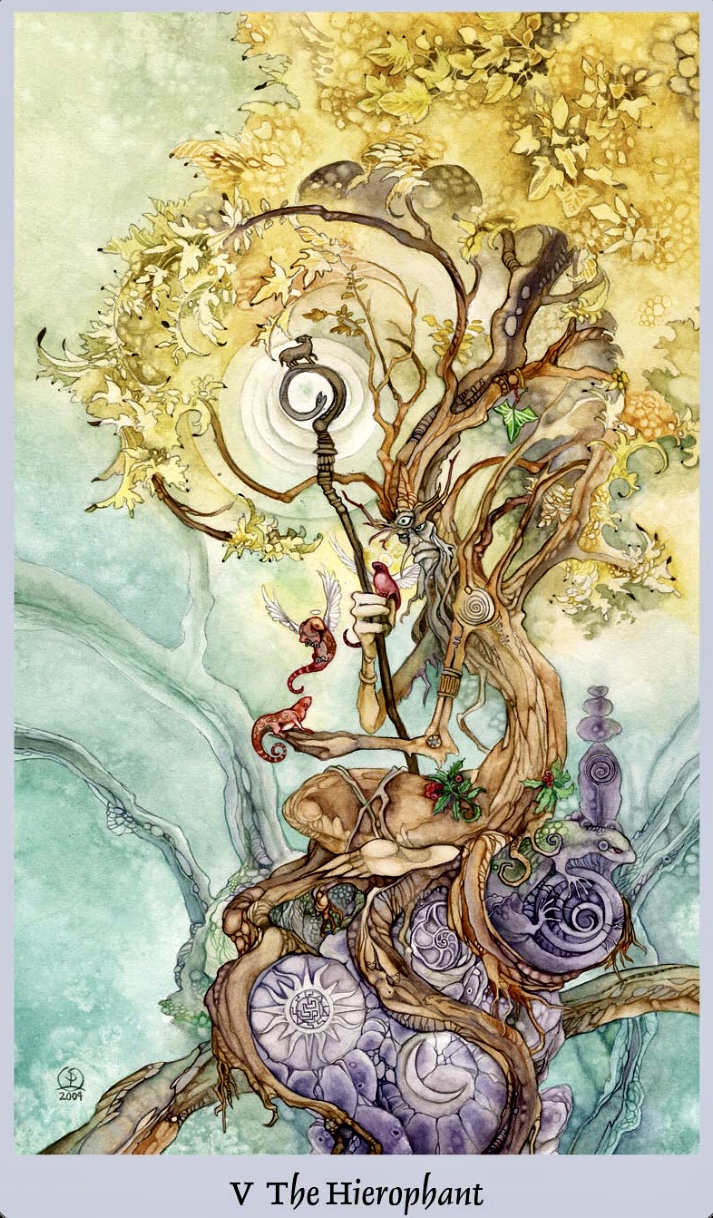
The Hierophant card generally indicates someone with a positive outlook on their lives and a strong belief about themselves. It signifies a person who is open to taking responsibility for his actions and not being bound by preconceived notions. It represents someone who is looking for his purpose and meaning. It also shows the differences between two people, and it shows the tension that arises between a person's values. It is also a card that can be used to solve conflicts.
The reversed Hierophant shows the difference in beliefs between two people. It can indicate someone who refuses to change his opinions, or it could reflect society pressure. It also indicates tension between systems, be they political, religious, or social.

The reversed Hierophant can be used to indicate a person's desire to question traditional beliefs. It can also signify someone who struggles with adapting to new circumstances. It is also a card that reflects a person who is struggling to change his work environment. It may also reflect a person in legal or illegal situations. It can also be used to show someone who is in a bad relationship. It can also signify a person wanting to change their diet or exercise routine. It can also indicate that someone is going through divorce. It can also indicate someone who needs to make a decision about their relationship and isn't sure what to do. It can also signify that someone needs to seek advice before embarking on a new journey. It can also be used to show someone who believes there are better ways of achieving a goal.
It can also signify that someone is trying their best to manage a situation which is not within their expertise. It can also signify a person without the required knowledge to make a choice or work within a certain industry. It can also reveal someone who desires to change but cannot without conflict. It can also show a person who feels that their actions are illegal.
It can also signal a person being in a difficult relationship with someone they are not ready to change. It can also be used to indicate someone who is prone to arguing with authority figures. It can also indicate a person with strong beliefs but doesn't respect the rules of society. It can also signify a person who doesn't want to follow tradition even if they don’t know why.

It can also indicate a person’s relationship with a loved one. It can show someone who won't change their opinions even if they aren't in the best interest. It can also show a person who does not want to break with a tradition, or a person who feels they have no other option.
FAQ
Why do we have hobbies?
Hobbies can be a part of your life because they provide you with time to unwind, recharge, think creatively as well as the chance to exercise, socialize, and relax. They also provide us with opportunities for learning new skills and developing valuable life-long interests.
Hobbies help us to find meaning and purpose in our lives.
These are a great way for you to have some free time, even if there isn't much else.
They are fun!
If you don't have time for a hobby, then you probably don't have time for anything else either.
Look at all the options. Perhaps you should get a hobby started today if you don’t already have one.
What's a hobby?
A hobby for kids is any activity they like to do as part of their normal daily routine. Some kids like to build things, draw, paint, write, or play with toys.
Many parents are concerned that their children may get into trouble if allowed to do as they please. It is not true. If your child is safe and doesn't cause harm to themselves or anyone else, they won't get into trouble.
It is important to keep in mind that just because someone likes something, doesn't mean they will choose it every time. If they don't like writing but love drawing, they might choose to draw images instead.
There are many hobbies to choose from, so it's up you to find the one that interests you most.
What are educational hobbies?
An educational hobby can be defined as an activity in which you learn something through doing it. This could be anything you want, such as playing sports or learning how to play an instruments.
The key thing is that it should be fun and enjoyable for you. You don't necessarily have to do this all the time. But if it becomes boring, then think about what you could be doing.
These activities could end up costing you far more than what you pay for.
What are some great hobbies?
It's the hobbies you are most passionate about that make you happy. You will find it easier to stay motivated if you love what your doing. This will give you a reason for not feeling well, or tired.
Our hobbies include painting, crafts, photography and cooking.
Consider volunteering at your local animal shelter, charity shop, hospice, children's hospital or hospice, elderly care home, school center, church, or community center.
Suppose you're looking for something more adventurous. Try scuba diving, rock climbing or parasailing.
There are many unique ways to spend time in the outdoors, whether you're looking for adventure or a more traditional way to do it. These include caving.
Statistics
- Studies show that just six minutes of reading can reduce stress levels by 60 percent. (oberlo.com)
- The intensity of the dialogue partners' bond at the end of the forty-five-minute vulnerability interaction was rated as closer than the closest relationship in the lives of 30 percent of similar students. (time.com)
- Almost 80% of people claim to have no hobby. (hobbylark.com)
- This 100% accurate personality-analyzing hobby quiz discovers your passion based on your characteristics. (quizexpo.com)
- 37% Video Games 36% Travel 36% Health and Fitness (quizexpo.com)
External Links
How To
How to start gardening
Gardening is one form of agriculture that dates back to the beginning. You need patience, perseverance, and determination. The first step to starting a garden is to pick a spot where you will grow food. It could be large land, or just your backyard. Next, choose what kind of plants you would like to grow. Do you prefer flowers over vegetables? Some people are passionate about growing herbs, while others like raising livestock like rabbits. Before you decide which crops you will plant, consider the amount of space you have. If your climate is cold, you may decide to plant berries and fruits.
After you have decided what you want to plant, it is important that you prepare the soil. It is vital that your soil is prepared properly to determine whether or not your plants will thrive. High quality soil is rich in organic matter, which feeds your plants' roots. Organic matter is made up of leaves, twigs grass clippings, manure and compost. Once you have prepared your soil, you need to add nutrients. The type of plant you intend to grow will dictate the amount of nutrients you need. Online fertilizer calculators can be used to determine these values. There are many fertilizers on the market, so ensure you understand what you are buying.
After you have prepared your soil, and added the correct nutrients, you will need to wait until your seed germinates. The process typically takes 2 to 3 weeks depending on the weather conditions and temperature in your area. Once the seeds have sprouted you will need to water them often. Overwatering your plants can lead to problems. Ensure you give your plants enough water at regular intervals and avoid overwatering. Overwatering your plants can lead to root disease and fungal infections. Remember that plants need less water in the summer than they do in the winter. Keep in mind that certain plants may need to be dried after being watered. Tomatoes for instance need to remain slightly moist, but not wet. Soggy soil is not a good choice for tomatoes. After they have finished flowering, they must go dormant. When plants stop producing new growth, they go dormant and start storing energy for next season's harvest. The plant ceases sending signals to its roots to produce food during dormancy. Throughout this period, the plant stores energy. However, if the temperatures drop below freezing and there isn't enough sunlight, the plant will go to sleep.
Living in urban areas may restrict the types of plants you can plant. Concrete sidewalks, roads or parking lots can block sunlight from reaching urban areas. Concrete absorbs light which blocks sunlight from reaching the ground below. Many plants can't survive in urban environments due to lack of sunlight. There are many plants that can survive in urban environments. Many trees, shrubs, and perennials can adapt to city living. Many annuals can be grown indoors, too, in containers. Container gardens can be used to grow greenery indoors year-round, no matter what the weather outside.
Now you're ready to plant.